Medicalization of the Self
VerifiedAdded on 2022/12/28
|17
|4732
|1
AI Summary
This essay discusses the decline of the welfare state in the United Kingdom since the late 1970s and its impact on the most vulnerable members of society. It also explores the influence of eugenics on the New Public Health agenda and the consequences for the body and health. The concept of medicalization of the self is examined in relation to these topics.
Contribute Materials
Your contribution can guide someone’s learning journey. Share your
documents today.
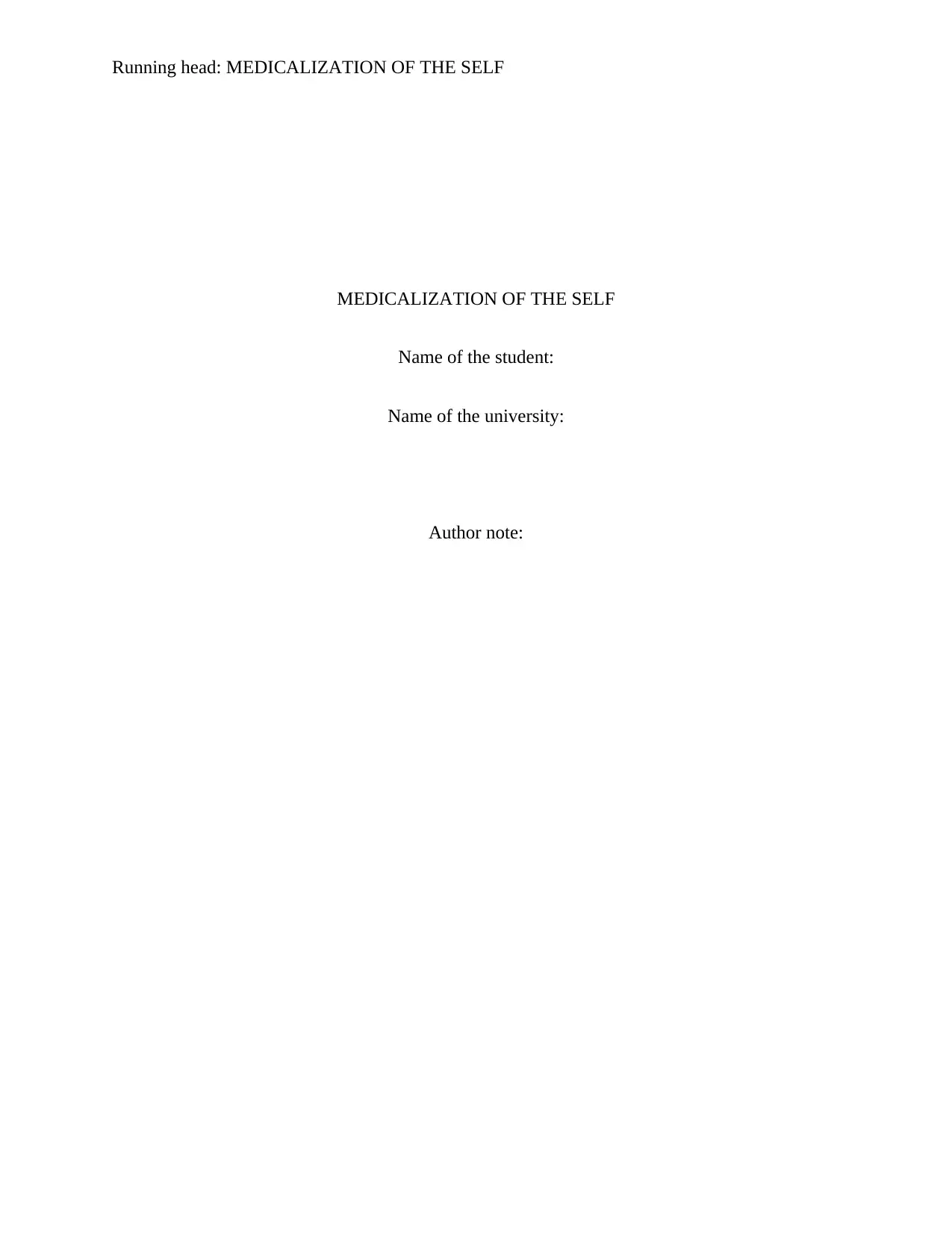
Running head: MEDICALIZATION OF THE SELF
MEDICALIZATION OF THE SELF
Name of the student:
Name of the university:
Author note:
MEDICALIZATION OF THE SELF
Name of the student:
Name of the university:
Author note:
Secure Best Marks with AI Grader
Need help grading? Try our AI Grader for instant feedback on your assignments.
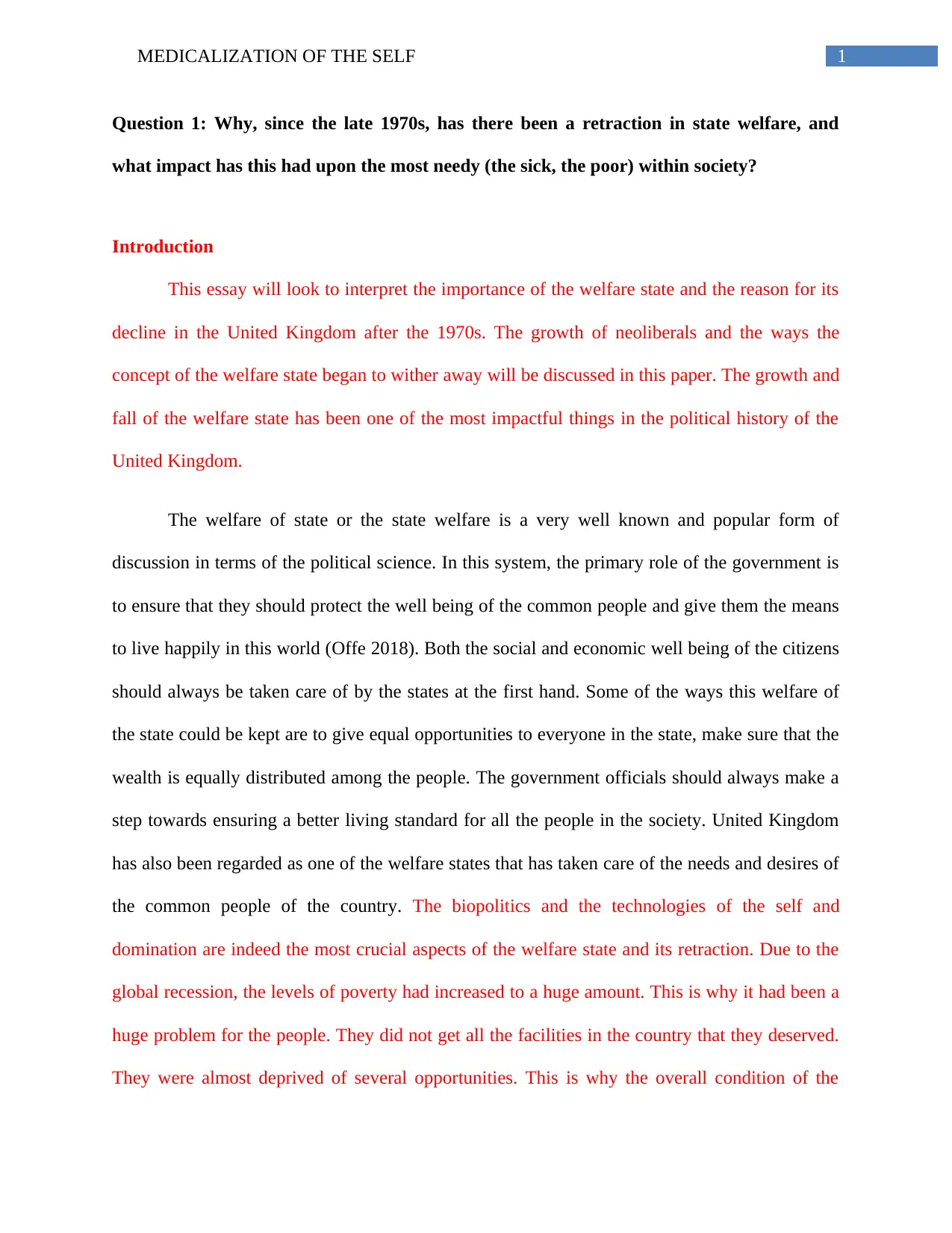
1MEDICALIZATION OF THE SELF
Question 1: Why, since the late 1970s, has there been a retraction in state welfare, and
what impact has this had upon the most needy (the sick, the poor) within society?
Introduction
This essay will look to interpret the importance of the welfare state and the reason for its
decline in the United Kingdom after the 1970s. The growth of neoliberals and the ways the
concept of the welfare state began to wither away will be discussed in this paper. The growth and
fall of the welfare state has been one of the most impactful things in the political history of the
United Kingdom.
The welfare of state or the state welfare is a very well known and popular form of
discussion in terms of the political science. In this system, the primary role of the government is
to ensure that they should protect the well being of the common people and give them the means
to live happily in this world (Offe 2018). Both the social and economic well being of the citizens
should always be taken care of by the states at the first hand. Some of the ways this welfare of
the state could be kept are to give equal opportunities to everyone in the state, make sure that the
wealth is equally distributed among the people. The government officials should always make a
step towards ensuring a better living standard for all the people in the society. United Kingdom
has also been regarded as one of the welfare states that has taken care of the needs and desires of
the common people of the country. The biopolitics and the technologies of the self and
domination are indeed the most crucial aspects of the welfare state and its retraction. Due to the
global recession, the levels of poverty had increased to a huge amount. This is why it had been a
huge problem for the people. They did not get all the facilities in the country that they deserved.
They were almost deprived of several opportunities. This is why the overall condition of the
Question 1: Why, since the late 1970s, has there been a retraction in state welfare, and
what impact has this had upon the most needy (the sick, the poor) within society?
Introduction
This essay will look to interpret the importance of the welfare state and the reason for its
decline in the United Kingdom after the 1970s. The growth of neoliberals and the ways the
concept of the welfare state began to wither away will be discussed in this paper. The growth and
fall of the welfare state has been one of the most impactful things in the political history of the
United Kingdom.
The welfare of state or the state welfare is a very well known and popular form of
discussion in terms of the political science. In this system, the primary role of the government is
to ensure that they should protect the well being of the common people and give them the means
to live happily in this world (Offe 2018). Both the social and economic well being of the citizens
should always be taken care of by the states at the first hand. Some of the ways this welfare of
the state could be kept are to give equal opportunities to everyone in the state, make sure that the
wealth is equally distributed among the people. The government officials should always make a
step towards ensuring a better living standard for all the people in the society. United Kingdom
has also been regarded as one of the welfare states that has taken care of the needs and desires of
the common people of the country. The biopolitics and the technologies of the self and
domination are indeed the most crucial aspects of the welfare state and its retraction. Due to the
global recession, the levels of poverty had increased to a huge amount. This is why it had been a
huge problem for the people. They did not get all the facilities in the country that they deserved.
They were almost deprived of several opportunities. This is why the overall condition of the
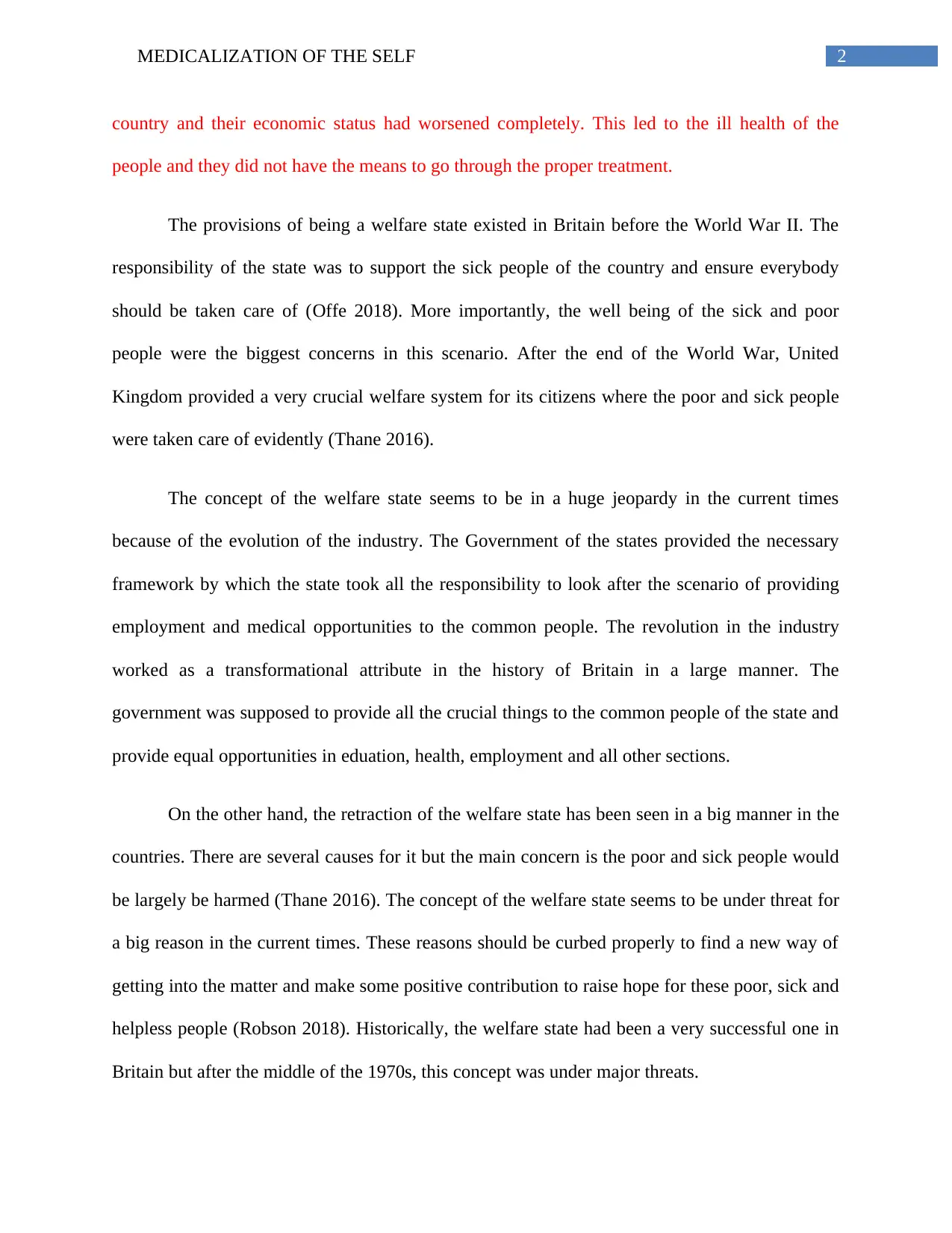
2MEDICALIZATION OF THE SELF
country and their economic status had worsened completely. This led to the ill health of the
people and they did not have the means to go through the proper treatment.
The provisions of being a welfare state existed in Britain before the World War II. The
responsibility of the state was to support the sick people of the country and ensure everybody
should be taken care of (Offe 2018). More importantly, the well being of the sick and poor
people were the biggest concerns in this scenario. After the end of the World War, United
Kingdom provided a very crucial welfare system for its citizens where the poor and sick people
were taken care of evidently (Thane 2016).
The concept of the welfare state seems to be in a huge jeopardy in the current times
because of the evolution of the industry. The Government of the states provided the necessary
framework by which the state took all the responsibility to look after the scenario of providing
employment and medical opportunities to the common people. The revolution in the industry
worked as a transformational attribute in the history of Britain in a large manner. The
government was supposed to provide all the crucial things to the common people of the state and
provide equal opportunities in eduation, health, employment and all other sections.
On the other hand, the retraction of the welfare state has been seen in a big manner in the
countries. There are several causes for it but the main concern is the poor and sick people would
be largely be harmed (Thane 2016). The concept of the welfare state seems to be under threat for
a big reason in the current times. These reasons should be curbed properly to find a new way of
getting into the matter and make some positive contribution to raise hope for these poor, sick and
helpless people (Robson 2018). Historically, the welfare state had been a very successful one in
Britain but after the middle of the 1970s, this concept was under major threats.
country and their economic status had worsened completely. This led to the ill health of the
people and they did not have the means to go through the proper treatment.
The provisions of being a welfare state existed in Britain before the World War II. The
responsibility of the state was to support the sick people of the country and ensure everybody
should be taken care of (Offe 2018). More importantly, the well being of the sick and poor
people were the biggest concerns in this scenario. After the end of the World War, United
Kingdom provided a very crucial welfare system for its citizens where the poor and sick people
were taken care of evidently (Thane 2016).
The concept of the welfare state seems to be in a huge jeopardy in the current times
because of the evolution of the industry. The Government of the states provided the necessary
framework by which the state took all the responsibility to look after the scenario of providing
employment and medical opportunities to the common people. The revolution in the industry
worked as a transformational attribute in the history of Britain in a large manner. The
government was supposed to provide all the crucial things to the common people of the state and
provide equal opportunities in eduation, health, employment and all other sections.
On the other hand, the retraction of the welfare state has been seen in a big manner in the
countries. There are several causes for it but the main concern is the poor and sick people would
be largely be harmed (Thane 2016). The concept of the welfare state seems to be under threat for
a big reason in the current times. These reasons should be curbed properly to find a new way of
getting into the matter and make some positive contribution to raise hope for these poor, sick and
helpless people (Robson 2018). Historically, the welfare state had been a very successful one in
Britain but after the middle of the 1970s, this concept was under major threats.
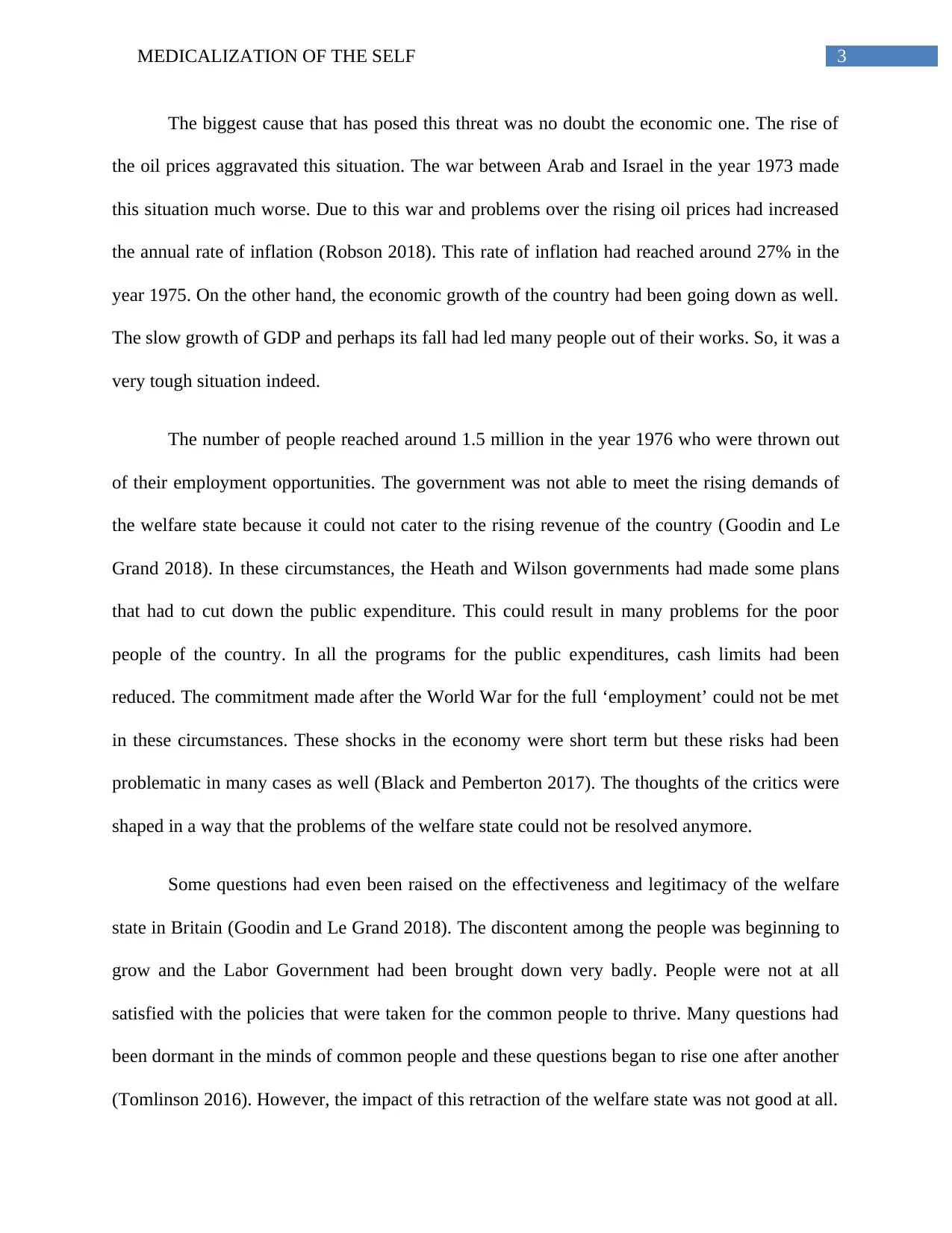
3MEDICALIZATION OF THE SELF
The biggest cause that has posed this threat was no doubt the economic one. The rise of
the oil prices aggravated this situation. The war between Arab and Israel in the year 1973 made
this situation much worse. Due to this war and problems over the rising oil prices had increased
the annual rate of inflation (Robson 2018). This rate of inflation had reached around 27% in the
year 1975. On the other hand, the economic growth of the country had been going down as well.
The slow growth of GDP and perhaps its fall had led many people out of their works. So, it was a
very tough situation indeed.
The number of people reached around 1.5 million in the year 1976 who were thrown out
of their employment opportunities. The government was not able to meet the rising demands of
the welfare state because it could not cater to the rising revenue of the country (Goodin and Le
Grand 2018). In these circumstances, the Heath and Wilson governments had made some plans
that had to cut down the public expenditure. This could result in many problems for the poor
people of the country. In all the programs for the public expenditures, cash limits had been
reduced. The commitment made after the World War for the full ‘employment’ could not be met
in these circumstances. These shocks in the economy were short term but these risks had been
problematic in many cases as well (Black and Pemberton 2017). The thoughts of the critics were
shaped in a way that the problems of the welfare state could not be resolved anymore.
Some questions had even been raised on the effectiveness and legitimacy of the welfare
state in Britain (Goodin and Le Grand 2018). The discontent among the people was beginning to
grow and the Labor Government had been brought down very badly. People were not at all
satisfied with the policies that were taken for the common people to thrive. Many questions had
been dormant in the minds of common people and these questions began to rise one after another
(Tomlinson 2016). However, the impact of this retraction of the welfare state was not good at all.
The biggest cause that has posed this threat was no doubt the economic one. The rise of
the oil prices aggravated this situation. The war between Arab and Israel in the year 1973 made
this situation much worse. Due to this war and problems over the rising oil prices had increased
the annual rate of inflation (Robson 2018). This rate of inflation had reached around 27% in the
year 1975. On the other hand, the economic growth of the country had been going down as well.
The slow growth of GDP and perhaps its fall had led many people out of their works. So, it was a
very tough situation indeed.
The number of people reached around 1.5 million in the year 1976 who were thrown out
of their employment opportunities. The government was not able to meet the rising demands of
the welfare state because it could not cater to the rising revenue of the country (Goodin and Le
Grand 2018). In these circumstances, the Heath and Wilson governments had made some plans
that had to cut down the public expenditure. This could result in many problems for the poor
people of the country. In all the programs for the public expenditures, cash limits had been
reduced. The commitment made after the World War for the full ‘employment’ could not be met
in these circumstances. These shocks in the economy were short term but these risks had been
problematic in many cases as well (Black and Pemberton 2017). The thoughts of the critics were
shaped in a way that the problems of the welfare state could not be resolved anymore.
Some questions had even been raised on the effectiveness and legitimacy of the welfare
state in Britain (Goodin and Le Grand 2018). The discontent among the people was beginning to
grow and the Labor Government had been brought down very badly. People were not at all
satisfied with the policies that were taken for the common people to thrive. Many questions had
been dormant in the minds of common people and these questions began to rise one after another
(Tomlinson 2016). However, the impact of this retraction of the welfare state was not good at all.
Secure Best Marks with AI Grader
Need help grading? Try our AI Grader for instant feedback on your assignments.
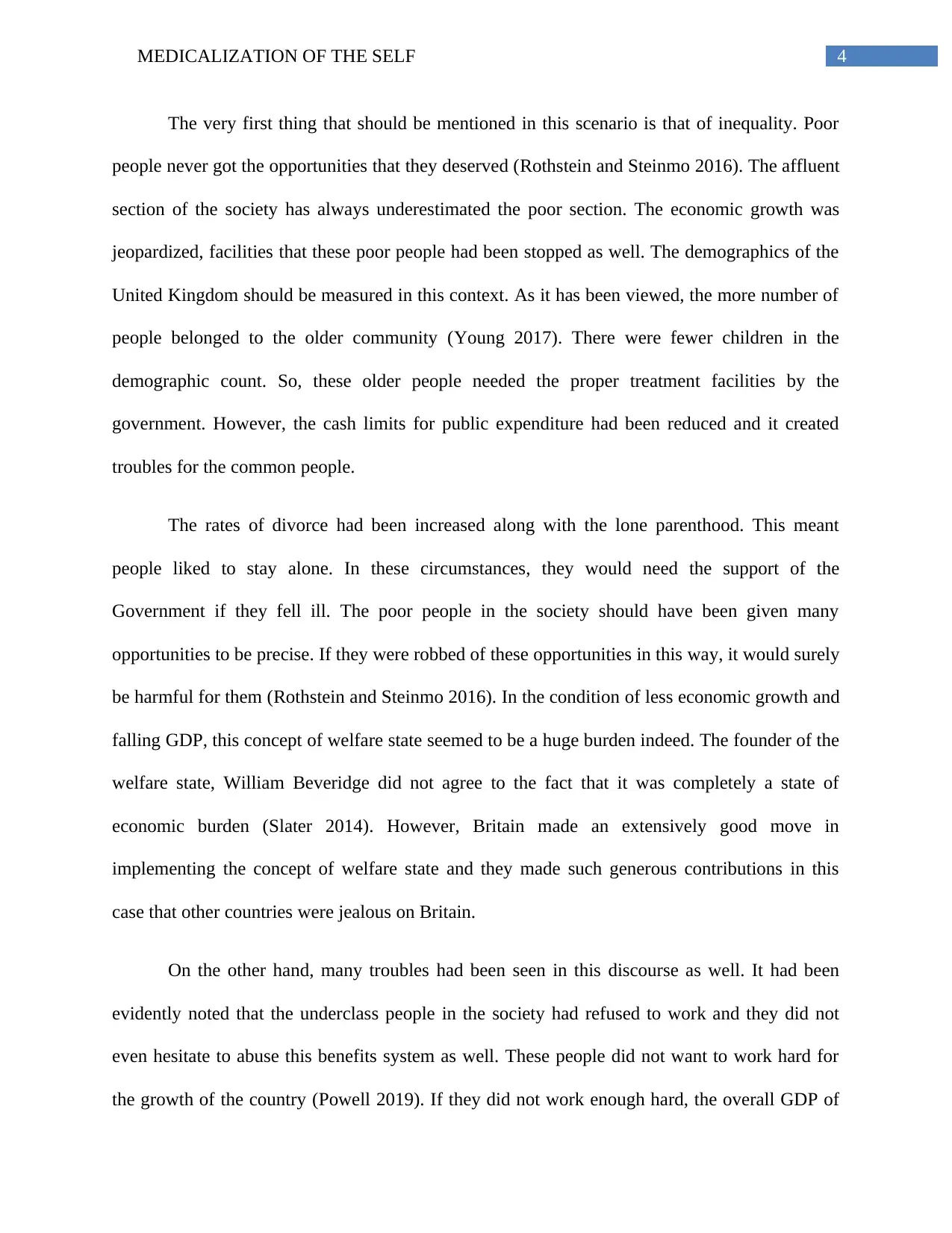
4MEDICALIZATION OF THE SELF
The very first thing that should be mentioned in this scenario is that of inequality. Poor
people never got the opportunities that they deserved (Rothstein and Steinmo 2016). The affluent
section of the society has always underestimated the poor section. The economic growth was
jeopardized, facilities that these poor people had been stopped as well. The demographics of the
United Kingdom should be measured in this context. As it has been viewed, the more number of
people belonged to the older community (Young 2017). There were fewer children in the
demographic count. So, these older people needed the proper treatment facilities by the
government. However, the cash limits for public expenditure had been reduced and it created
troubles for the common people.
The rates of divorce had been increased along with the lone parenthood. This meant
people liked to stay alone. In these circumstances, they would need the support of the
Government if they fell ill. The poor people in the society should have been given many
opportunities to be precise. If they were robbed of these opportunities in this way, it would surely
be harmful for them (Rothstein and Steinmo 2016). In the condition of less economic growth and
falling GDP, this concept of welfare state seemed to be a huge burden indeed. The founder of the
welfare state, William Beveridge did not agree to the fact that it was completely a state of
economic burden (Slater 2014). However, Britain made an extensively good move in
implementing the concept of welfare state and they made such generous contributions in this
case that other countries were jealous on Britain.
On the other hand, many troubles had been seen in this discourse as well. It had been
evidently noted that the underclass people in the society had refused to work and they did not
even hesitate to abuse this benefits system as well. These people did not want to work hard for
the growth of the country (Powell 2019). If they did not work enough hard, the overall GDP of
The very first thing that should be mentioned in this scenario is that of inequality. Poor
people never got the opportunities that they deserved (Rothstein and Steinmo 2016). The affluent
section of the society has always underestimated the poor section. The economic growth was
jeopardized, facilities that these poor people had been stopped as well. The demographics of the
United Kingdom should be measured in this context. As it has been viewed, the more number of
people belonged to the older community (Young 2017). There were fewer children in the
demographic count. So, these older people needed the proper treatment facilities by the
government. However, the cash limits for public expenditure had been reduced and it created
troubles for the common people.
The rates of divorce had been increased along with the lone parenthood. This meant
people liked to stay alone. In these circumstances, they would need the support of the
Government if they fell ill. The poor people in the society should have been given many
opportunities to be precise. If they were robbed of these opportunities in this way, it would surely
be harmful for them (Rothstein and Steinmo 2016). In the condition of less economic growth and
falling GDP, this concept of welfare state seemed to be a huge burden indeed. The founder of the
welfare state, William Beveridge did not agree to the fact that it was completely a state of
economic burden (Slater 2014). However, Britain made an extensively good move in
implementing the concept of welfare state and they made such generous contributions in this
case that other countries were jealous on Britain.
On the other hand, many troubles had been seen in this discourse as well. It had been
evidently noted that the underclass people in the society had refused to work and they did not
even hesitate to abuse this benefits system as well. These people did not want to work hard for
the growth of the country (Powell 2019). If they did not work enough hard, the overall GDP of
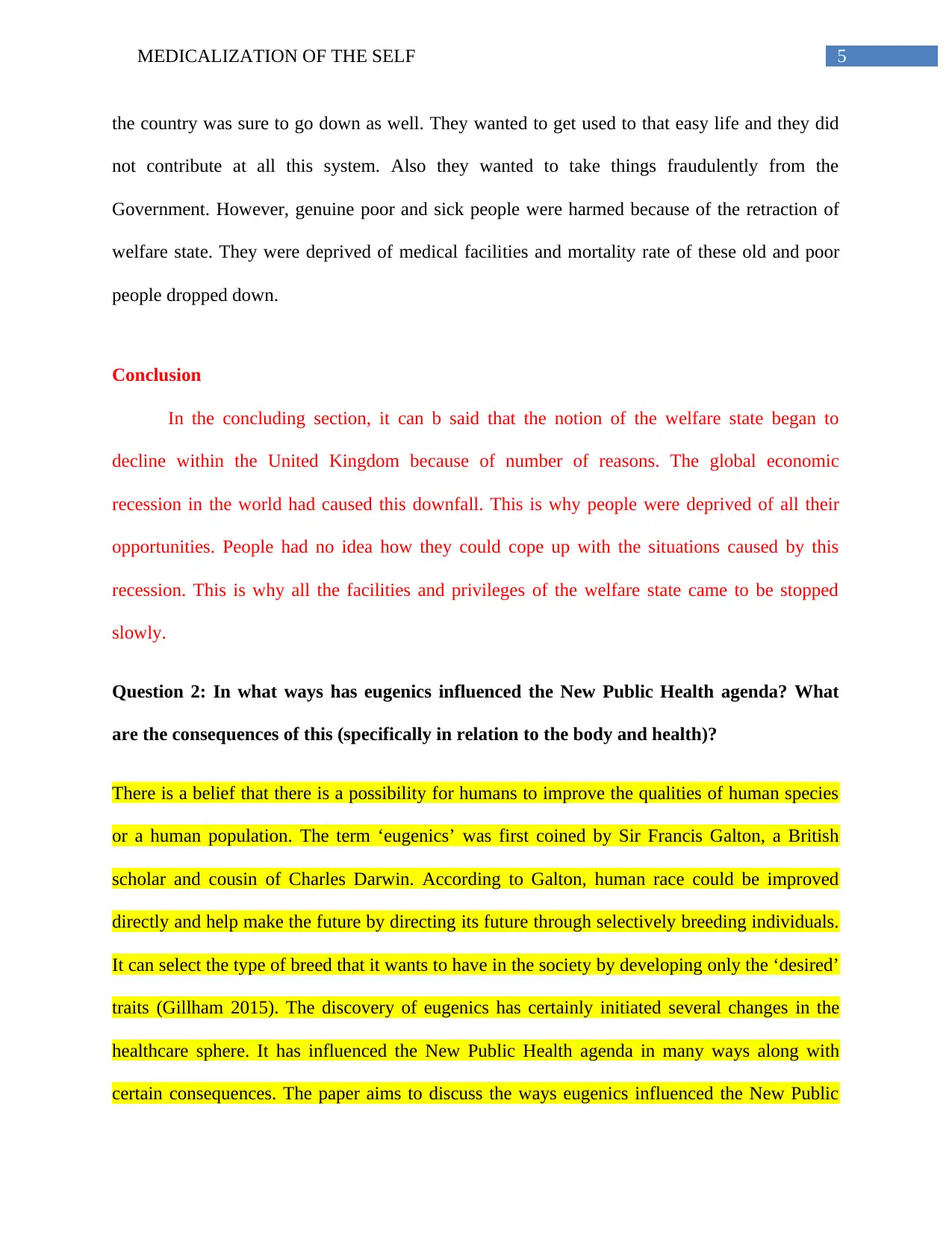
5MEDICALIZATION OF THE SELF
the country was sure to go down as well. They wanted to get used to that easy life and they did
not contribute at all this system. Also they wanted to take things fraudulently from the
Government. However, genuine poor and sick people were harmed because of the retraction of
welfare state. They were deprived of medical facilities and mortality rate of these old and poor
people dropped down.
Conclusion
In the concluding section, it can b said that the notion of the welfare state began to
decline within the United Kingdom because of number of reasons. The global economic
recession in the world had caused this downfall. This is why people were deprived of all their
opportunities. People had no idea how they could cope up with the situations caused by this
recession. This is why all the facilities and privileges of the welfare state came to be stopped
slowly.
Question 2: In what ways has eugenics influenced the New Public Health agenda? What
are the consequences of this (specifically in relation to the body and health)?
There is a belief that there is a possibility for humans to improve the qualities of human species
or a human population. The term ‘eugenics’ was first coined by Sir Francis Galton, a British
scholar and cousin of Charles Darwin. According to Galton, human race could be improved
directly and help make the future by directing its future through selectively breeding individuals.
It can select the type of breed that it wants to have in the society by developing only the ‘desired’
traits (Gillham 2015). The discovery of eugenics has certainly initiated several changes in the
healthcare sphere. It has influenced the New Public Health agenda in many ways along with
certain consequences. The paper aims to discuss the ways eugenics influenced the New Public
the country was sure to go down as well. They wanted to get used to that easy life and they did
not contribute at all this system. Also they wanted to take things fraudulently from the
Government. However, genuine poor and sick people were harmed because of the retraction of
welfare state. They were deprived of medical facilities and mortality rate of these old and poor
people dropped down.
Conclusion
In the concluding section, it can b said that the notion of the welfare state began to
decline within the United Kingdom because of number of reasons. The global economic
recession in the world had caused this downfall. This is why people were deprived of all their
opportunities. People had no idea how they could cope up with the situations caused by this
recession. This is why all the facilities and privileges of the welfare state came to be stopped
slowly.
Question 2: In what ways has eugenics influenced the New Public Health agenda? What
are the consequences of this (specifically in relation to the body and health)?
There is a belief that there is a possibility for humans to improve the qualities of human species
or a human population. The term ‘eugenics’ was first coined by Sir Francis Galton, a British
scholar and cousin of Charles Darwin. According to Galton, human race could be improved
directly and help make the future by directing its future through selectively breeding individuals.
It can select the type of breed that it wants to have in the society by developing only the ‘desired’
traits (Gillham 2015). The discovery of eugenics has certainly initiated several changes in the
healthcare sphere. It has influenced the New Public Health agenda in many ways along with
certain consequences. The paper aims to discuss the ways eugenics influenced the New Public
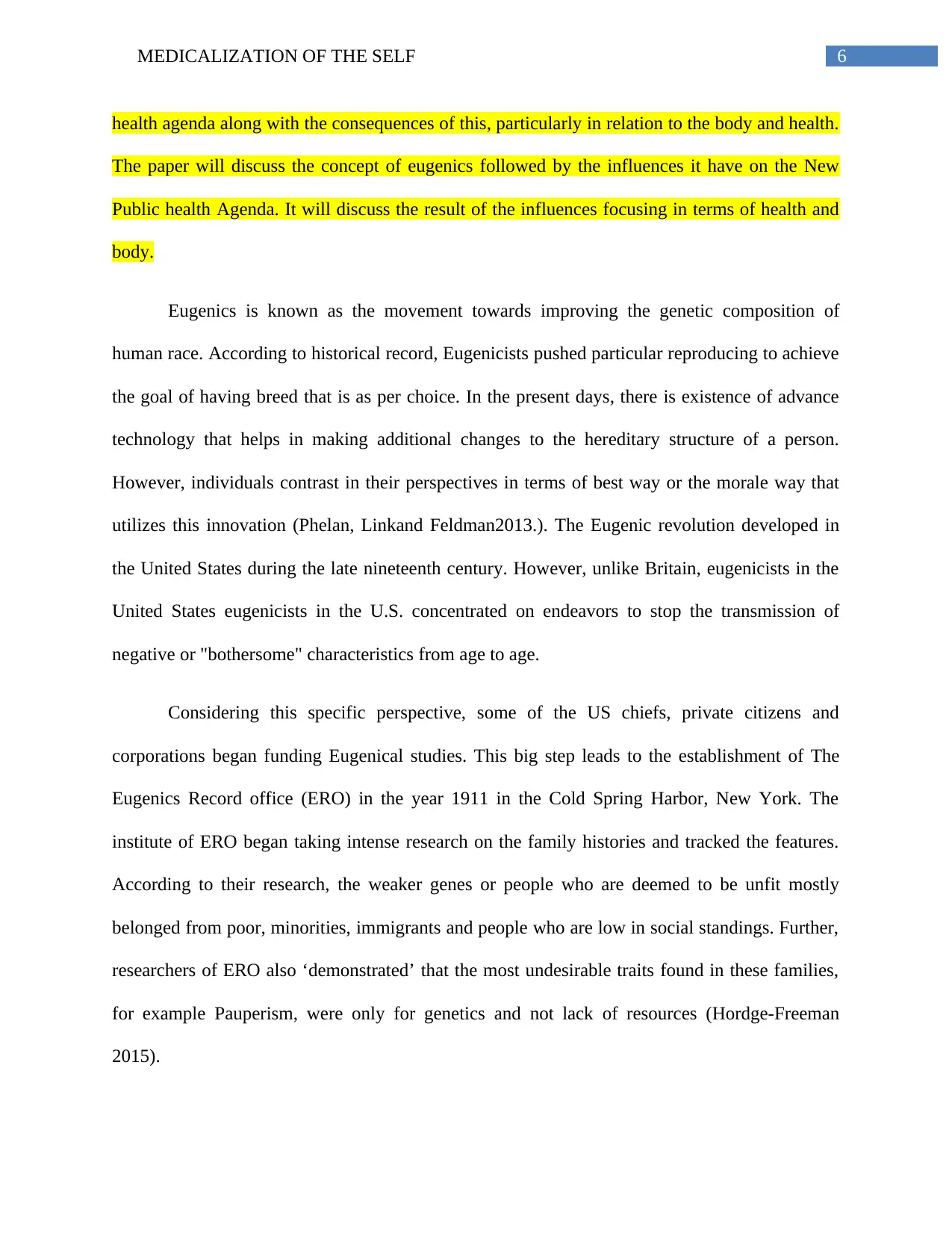
6MEDICALIZATION OF THE SELF
health agenda along with the consequences of this, particularly in relation to the body and health.
The paper will discuss the concept of eugenics followed by the influences it have on the New
Public health Agenda. It will discuss the result of the influences focusing in terms of health and
body.
Eugenics is known as the movement towards improving the genetic composition of
human race. According to historical record, Eugenicists pushed particular reproducing to achieve
the goal of having breed that is as per choice. In the present days, there is existence of advance
technology that helps in making additional changes to the hereditary structure of a person.
However, individuals contrast in their perspectives in terms of best way or the morale way that
utilizes this innovation (Phelan, Linkand Feldman2013.). The Eugenic revolution developed in
the United States during the late nineteenth century. However, unlike Britain, eugenicists in the
United States eugenicists in the U.S. concentrated on endeavors to stop the transmission of
negative or "bothersome" characteristics from age to age.
Considering this specific perspective, some of the US chiefs, private citizens and
corporations began funding Eugenical studies. This big step leads to the establishment of The
Eugenics Record office (ERO) in the year 1911 in the Cold Spring Harbor, New York. The
institute of ERO began taking intense research on the family histories and tracked the features.
According to their research, the weaker genes or people who are deemed to be unfit mostly
belonged from poor, minorities, immigrants and people who are low in social standings. Further,
researchers of ERO also ‘demonstrated’ that the most undesirable traits found in these families,
for example Pauperism, were only for genetics and not lack of resources (Hordge-Freeman
2015).
health agenda along with the consequences of this, particularly in relation to the body and health.
The paper will discuss the concept of eugenics followed by the influences it have on the New
Public health Agenda. It will discuss the result of the influences focusing in terms of health and
body.
Eugenics is known as the movement towards improving the genetic composition of
human race. According to historical record, Eugenicists pushed particular reproducing to achieve
the goal of having breed that is as per choice. In the present days, there is existence of advance
technology that helps in making additional changes to the hereditary structure of a person.
However, individuals contrast in their perspectives in terms of best way or the morale way that
utilizes this innovation (Phelan, Linkand Feldman2013.). The Eugenic revolution developed in
the United States during the late nineteenth century. However, unlike Britain, eugenicists in the
United States eugenicists in the U.S. concentrated on endeavors to stop the transmission of
negative or "bothersome" characteristics from age to age.
Considering this specific perspective, some of the US chiefs, private citizens and
corporations began funding Eugenical studies. This big step leads to the establishment of The
Eugenics Record office (ERO) in the year 1911 in the Cold Spring Harbor, New York. The
institute of ERO began taking intense research on the family histories and tracked the features.
According to their research, the weaker genes or people who are deemed to be unfit mostly
belonged from poor, minorities, immigrants and people who are low in social standings. Further,
researchers of ERO also ‘demonstrated’ that the most undesirable traits found in these families,
for example Pauperism, were only for genetics and not lack of resources (Hordge-Freeman
2015).
Paraphrase This Document
Need a fresh take? Get an instant paraphrase of this document with our AI Paraphraser
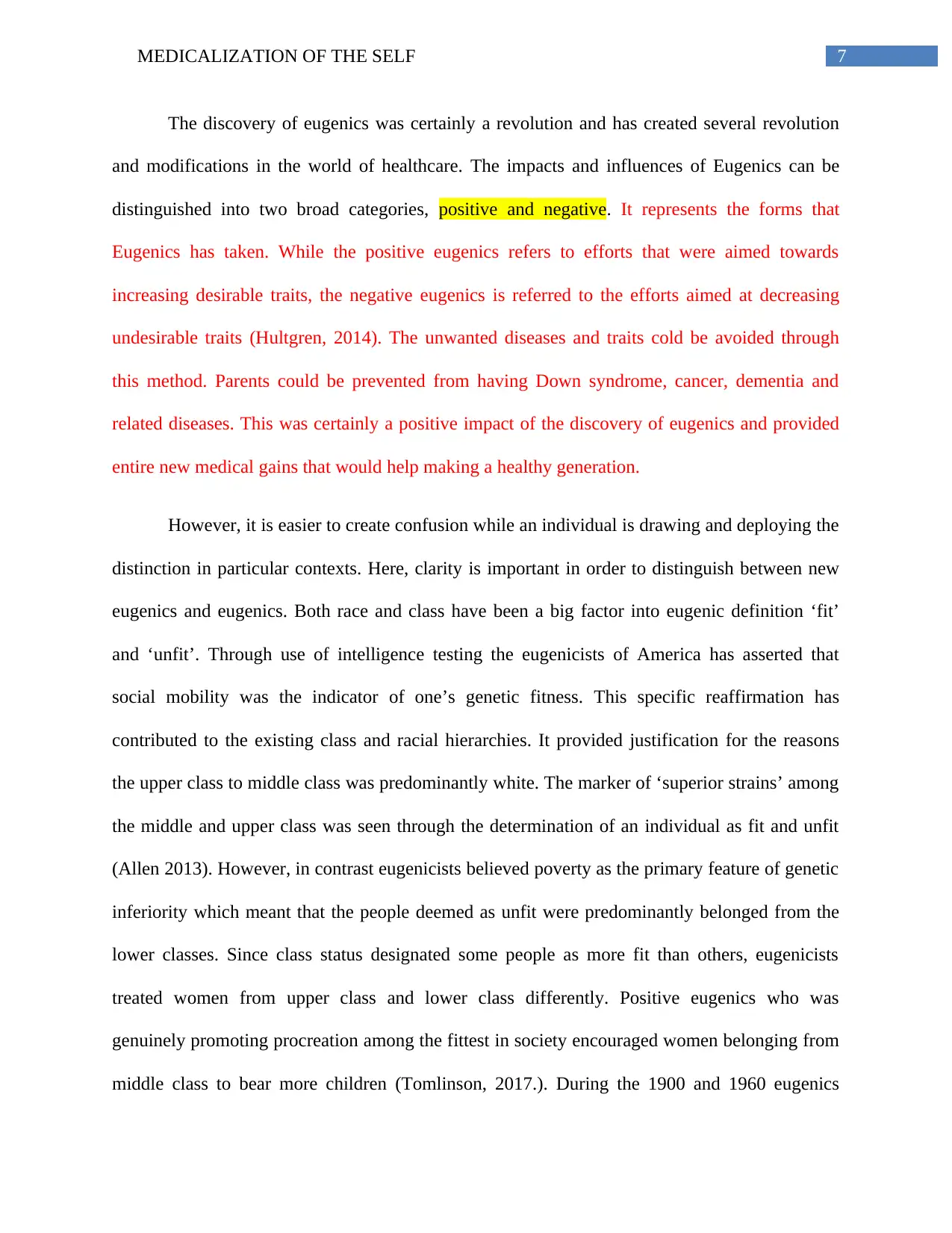
7MEDICALIZATION OF THE SELF
The discovery of eugenics was certainly a revolution and has created several revolution
and modifications in the world of healthcare. The impacts and influences of Eugenics can be
distinguished into two broad categories, positive and negative. It represents the forms that
Eugenics has taken. While the positive eugenics refers to efforts that were aimed towards
increasing desirable traits, the negative eugenics is referred to the efforts aimed at decreasing
undesirable traits (Hultgren, 2014). The unwanted diseases and traits cold be avoided through
this method. Parents could be prevented from having Down syndrome, cancer, dementia and
related diseases. This was certainly a positive impact of the discovery of eugenics and provided
entire new medical gains that would help making a healthy generation.
However, it is easier to create confusion while an individual is drawing and deploying the
distinction in particular contexts. Here, clarity is important in order to distinguish between new
eugenics and eugenics. Both race and class have been a big factor into eugenic definition ‘fit’
and ‘unfit’. Through use of intelligence testing the eugenicists of America has asserted that
social mobility was the indicator of one’s genetic fitness. This specific reaffirmation has
contributed to the existing class and racial hierarchies. It provided justification for the reasons
the upper class to middle class was predominantly white. The marker of ‘superior strains’ among
the middle and upper class was seen through the determination of an individual as fit and unfit
(Allen 2013). However, in contrast eugenicists believed poverty as the primary feature of genetic
inferiority which meant that the people deemed as unfit were predominantly belonged from the
lower classes. Since class status designated some people as more fit than others, eugenicists
treated women from upper class and lower class differently. Positive eugenics who was
genuinely promoting procreation among the fittest in society encouraged women belonging from
middle class to bear more children (Tomlinson, 2017.). During the 1900 and 1960 eugenics
The discovery of eugenics was certainly a revolution and has created several revolution
and modifications in the world of healthcare. The impacts and influences of Eugenics can be
distinguished into two broad categories, positive and negative. It represents the forms that
Eugenics has taken. While the positive eugenics refers to efforts that were aimed towards
increasing desirable traits, the negative eugenics is referred to the efforts aimed at decreasing
undesirable traits (Hultgren, 2014). The unwanted diseases and traits cold be avoided through
this method. Parents could be prevented from having Down syndrome, cancer, dementia and
related diseases. This was certainly a positive impact of the discovery of eugenics and provided
entire new medical gains that would help making a healthy generation.
However, it is easier to create confusion while an individual is drawing and deploying the
distinction in particular contexts. Here, clarity is important in order to distinguish between new
eugenics and eugenics. Both race and class have been a big factor into eugenic definition ‘fit’
and ‘unfit’. Through use of intelligence testing the eugenicists of America has asserted that
social mobility was the indicator of one’s genetic fitness. This specific reaffirmation has
contributed to the existing class and racial hierarchies. It provided justification for the reasons
the upper class to middle class was predominantly white. The marker of ‘superior strains’ among
the middle and upper class was seen through the determination of an individual as fit and unfit
(Allen 2013). However, in contrast eugenicists believed poverty as the primary feature of genetic
inferiority which meant that the people deemed as unfit were predominantly belonged from the
lower classes. Since class status designated some people as more fit than others, eugenicists
treated women from upper class and lower class differently. Positive eugenics who was
genuinely promoting procreation among the fittest in society encouraged women belonging from
middle class to bear more children (Tomlinson, 2017.). During the 1900 and 1960 eugenics

8MEDICALIZATION OF THE SELF
encouraged the middle class white women in becoming ‘family minded’ along with helping raise
‘more appropriate’ the race. In order to do this, the eugenicists frequently refused upper and
middle class women birth control and sterilization. As poverty was one of the factor associated
with mental idiocy and prostitution, women of the lower classes were first deemed as
‘promiscuous’ and ‘unfit’. These women were predominantly women of color or immigrants.
They were certainly discouraged from having any children and pushed towards usage of birth
control (Dyck 2014).
The consequences of the eugenics had to do with compulsory sterilization to a great
extent. Some states sterilized ‘imbeciles’ to a large extent during the 20th century. Even though in
the present day compulsory sterilization is considered as an abuse of human rights. The most
important era of eugenic sterilization was during the 1907 and 1963. It was a time when 64,000
individuals were sterilized forcibly under eugenic legislation in United States. Women and men
were compulsory sterilized for various reasons, men were sterilized in order to treat aggression
and for eliminating their criminal behavior (Rust and Golombok 2014). On the other hand
women were sterilized in order to have power over the consequences of their sexuality. Women
were held more responsible than men for the reproduction of the less ‘desirable’ members of
society for the fact it is women who borne children. Therefore, eugenicists predominantly
targeted women when putting efforts in order to control the birth rate. They were to guard
‘white’ racial health along with weeding out the ‘defectives’ of society (Moss, Stam and
Kattevilder 2013).
There is a belief that there is a possibility for humans to improve the qualities of human
species or a human population. The discovery of eugenics has certainly initiated several changes
in the healthcare sphere. It has influenced the New Public Health agenda in many ways along
encouraged the middle class white women in becoming ‘family minded’ along with helping raise
‘more appropriate’ the race. In order to do this, the eugenicists frequently refused upper and
middle class women birth control and sterilization. As poverty was one of the factor associated
with mental idiocy and prostitution, women of the lower classes were first deemed as
‘promiscuous’ and ‘unfit’. These women were predominantly women of color or immigrants.
They were certainly discouraged from having any children and pushed towards usage of birth
control (Dyck 2014).
The consequences of the eugenics had to do with compulsory sterilization to a great
extent. Some states sterilized ‘imbeciles’ to a large extent during the 20th century. Even though in
the present day compulsory sterilization is considered as an abuse of human rights. The most
important era of eugenic sterilization was during the 1907 and 1963. It was a time when 64,000
individuals were sterilized forcibly under eugenic legislation in United States. Women and men
were compulsory sterilized for various reasons, men were sterilized in order to treat aggression
and for eliminating their criminal behavior (Rust and Golombok 2014). On the other hand
women were sterilized in order to have power over the consequences of their sexuality. Women
were held more responsible than men for the reproduction of the less ‘desirable’ members of
society for the fact it is women who borne children. Therefore, eugenicists predominantly
targeted women when putting efforts in order to control the birth rate. They were to guard
‘white’ racial health along with weeding out the ‘defectives’ of society (Moss, Stam and
Kattevilder 2013).
There is a belief that there is a possibility for humans to improve the qualities of human
species or a human population. The discovery of eugenics has certainly initiated several changes
in the healthcare sphere. It has influenced the New Public Health agenda in many ways along
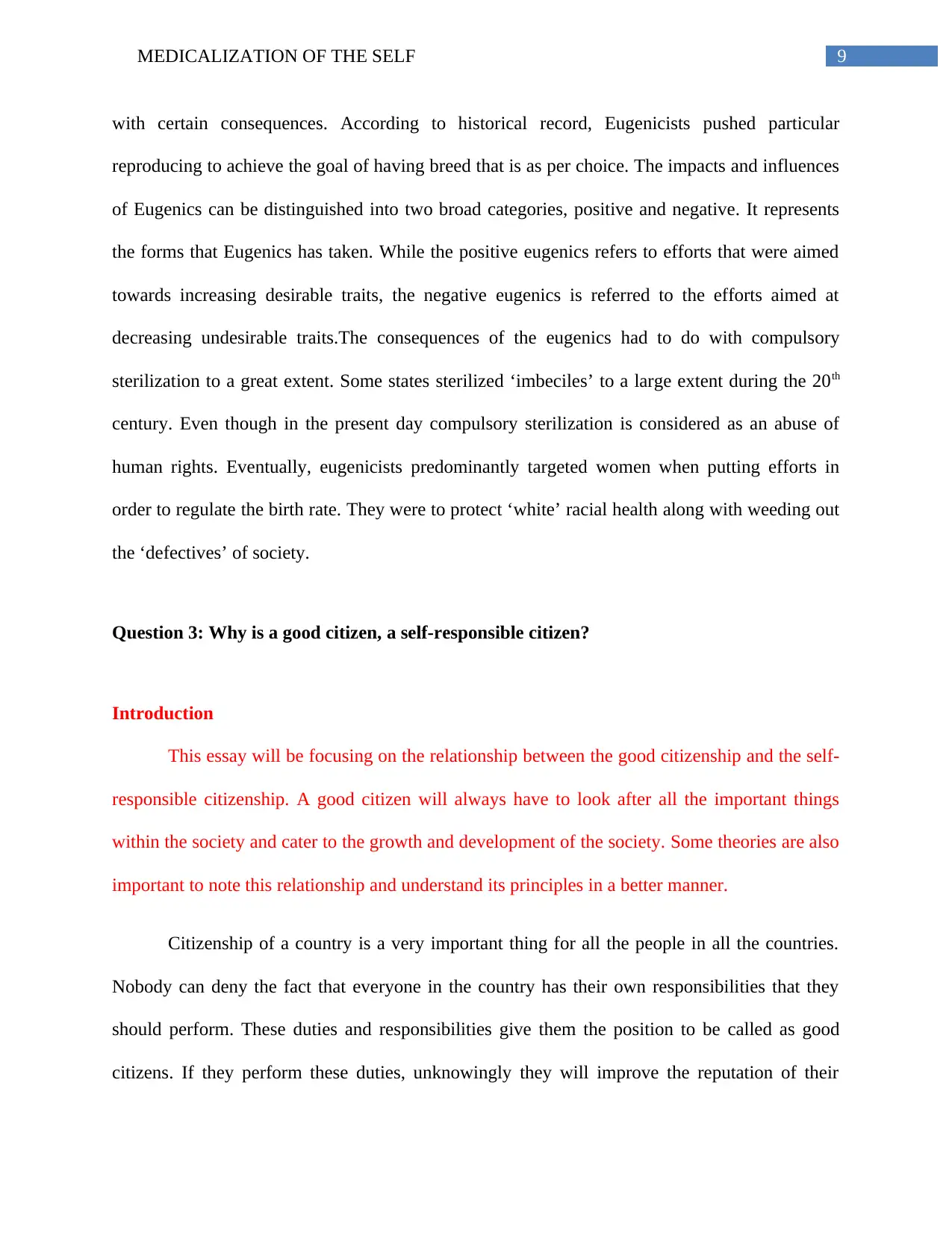
9MEDICALIZATION OF THE SELF
with certain consequences. According to historical record, Eugenicists pushed particular
reproducing to achieve the goal of having breed that is as per choice. The impacts and influences
of Eugenics can be distinguished into two broad categories, positive and negative. It represents
the forms that Eugenics has taken. While the positive eugenics refers to efforts that were aimed
towards increasing desirable traits, the negative eugenics is referred to the efforts aimed at
decreasing undesirable traits.The consequences of the eugenics had to do with compulsory
sterilization to a great extent. Some states sterilized ‘imbeciles’ to a large extent during the 20th
century. Even though in the present day compulsory sterilization is considered as an abuse of
human rights. Eventually, eugenicists predominantly targeted women when putting efforts in
order to regulate the birth rate. They were to protect ‘white’ racial health along with weeding out
the ‘defectives’ of society.
Question 3: Why is a good citizen, a self-responsible citizen?
Introduction
This essay will be focusing on the relationship between the good citizenship and the self-
responsible citizenship. A good citizen will always have to look after all the important things
within the society and cater to the growth and development of the society. Some theories are also
important to note this relationship and understand its principles in a better manner.
Citizenship of a country is a very important thing for all the people in all the countries.
Nobody can deny the fact that everyone in the country has their own responsibilities that they
should perform. These duties and responsibilities give them the position to be called as good
citizens. If they perform these duties, unknowingly they will improve the reputation of their
with certain consequences. According to historical record, Eugenicists pushed particular
reproducing to achieve the goal of having breed that is as per choice. The impacts and influences
of Eugenics can be distinguished into two broad categories, positive and negative. It represents
the forms that Eugenics has taken. While the positive eugenics refers to efforts that were aimed
towards increasing desirable traits, the negative eugenics is referred to the efforts aimed at
decreasing undesirable traits.The consequences of the eugenics had to do with compulsory
sterilization to a great extent. Some states sterilized ‘imbeciles’ to a large extent during the 20th
century. Even though in the present day compulsory sterilization is considered as an abuse of
human rights. Eventually, eugenicists predominantly targeted women when putting efforts in
order to regulate the birth rate. They were to protect ‘white’ racial health along with weeding out
the ‘defectives’ of society.
Question 3: Why is a good citizen, a self-responsible citizen?
Introduction
This essay will be focusing on the relationship between the good citizenship and the self-
responsible citizenship. A good citizen will always have to look after all the important things
within the society and cater to the growth and development of the society. Some theories are also
important to note this relationship and understand its principles in a better manner.
Citizenship of a country is a very important thing for all the people in all the countries.
Nobody can deny the fact that everyone in the country has their own responsibilities that they
should perform. These duties and responsibilities give them the position to be called as good
citizens. If they perform these duties, unknowingly they will improve the reputation of their
Secure Best Marks with AI Grader
Need help grading? Try our AI Grader for instant feedback on your assignments.
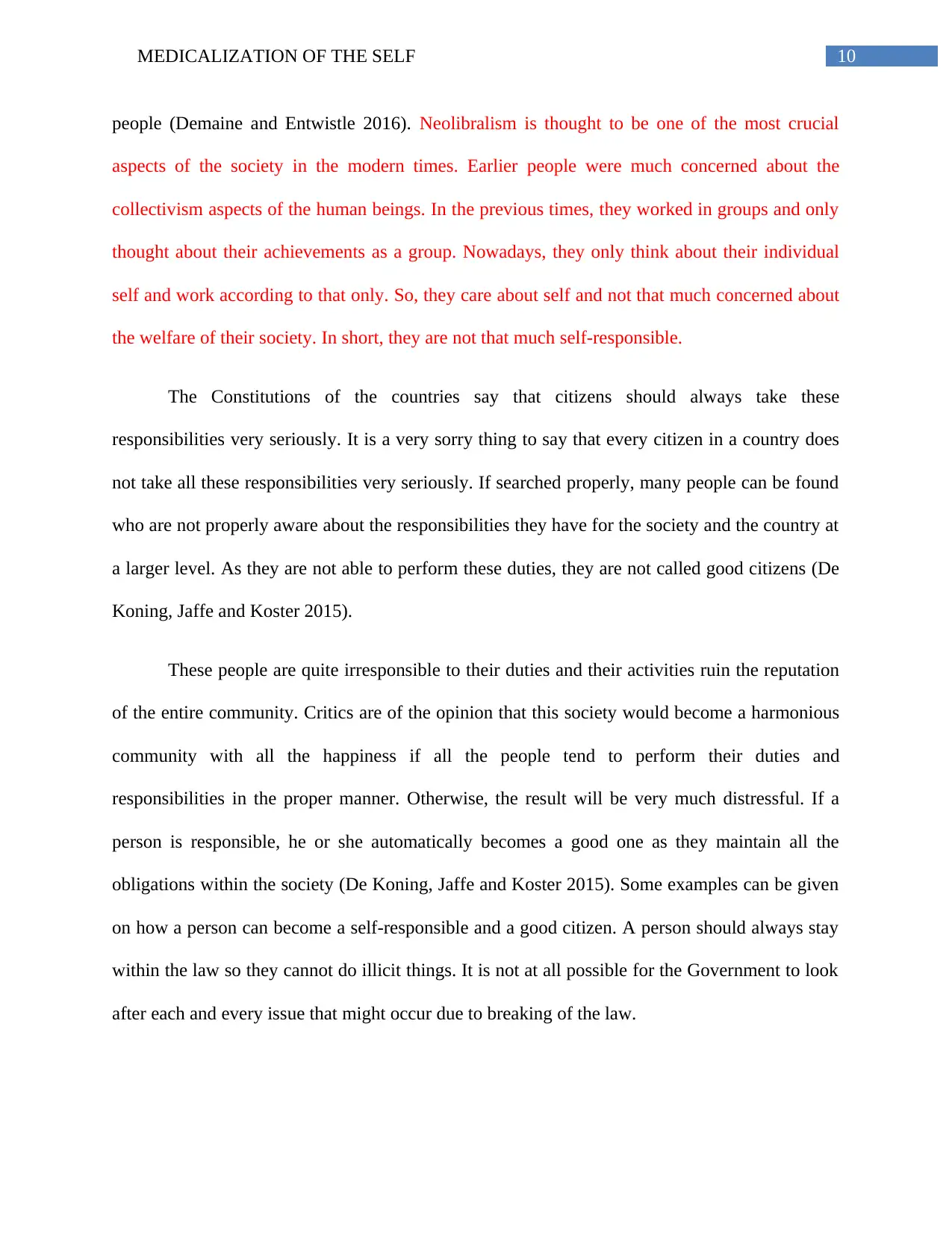
10MEDICALIZATION OF THE SELF
people (Demaine and Entwistle 2016). Neolibralism is thought to be one of the most crucial
aspects of the society in the modern times. Earlier people were much concerned about the
collectivism aspects of the human beings. In the previous times, they worked in groups and only
thought about their achievements as a group. Nowadays, they only think about their individual
self and work according to that only. So, they care about self and not that much concerned about
the welfare of their society. In short, they are not that much self-responsible.
The Constitutions of the countries say that citizens should always take these
responsibilities very seriously. It is a very sorry thing to say that every citizen in a country does
not take all these responsibilities very seriously. If searched properly, many people can be found
who are not properly aware about the responsibilities they have for the society and the country at
a larger level. As they are not able to perform these duties, they are not called good citizens (De
Koning, Jaffe and Koster 2015).
These people are quite irresponsible to their duties and their activities ruin the reputation
of the entire community. Critics are of the opinion that this society would become a harmonious
community with all the happiness if all the people tend to perform their duties and
responsibilities in the proper manner. Otherwise, the result will be very much distressful. If a
person is responsible, he or she automatically becomes a good one as they maintain all the
obligations within the society (De Koning, Jaffe and Koster 2015). Some examples can be given
on how a person can become a self-responsible and a good citizen. A person should always stay
within the law so they cannot do illicit things. It is not at all possible for the Government to look
after each and every issue that might occur due to breaking of the law.
people (Demaine and Entwistle 2016). Neolibralism is thought to be one of the most crucial
aspects of the society in the modern times. Earlier people were much concerned about the
collectivism aspects of the human beings. In the previous times, they worked in groups and only
thought about their achievements as a group. Nowadays, they only think about their individual
self and work according to that only. So, they care about self and not that much concerned about
the welfare of their society. In short, they are not that much self-responsible.
The Constitutions of the countries say that citizens should always take these
responsibilities very seriously. It is a very sorry thing to say that every citizen in a country does
not take all these responsibilities very seriously. If searched properly, many people can be found
who are not properly aware about the responsibilities they have for the society and the country at
a larger level. As they are not able to perform these duties, they are not called good citizens (De
Koning, Jaffe and Koster 2015).
These people are quite irresponsible to their duties and their activities ruin the reputation
of the entire community. Critics are of the opinion that this society would become a harmonious
community with all the happiness if all the people tend to perform their duties and
responsibilities in the proper manner. Otherwise, the result will be very much distressful. If a
person is responsible, he or she automatically becomes a good one as they maintain all the
obligations within the society (De Koning, Jaffe and Koster 2015). Some examples can be given
on how a person can become a self-responsible and a good citizen. A person should always stay
within the law so they cannot do illicit things. It is not at all possible for the Government to look
after each and every issue that might occur due to breaking of the law.
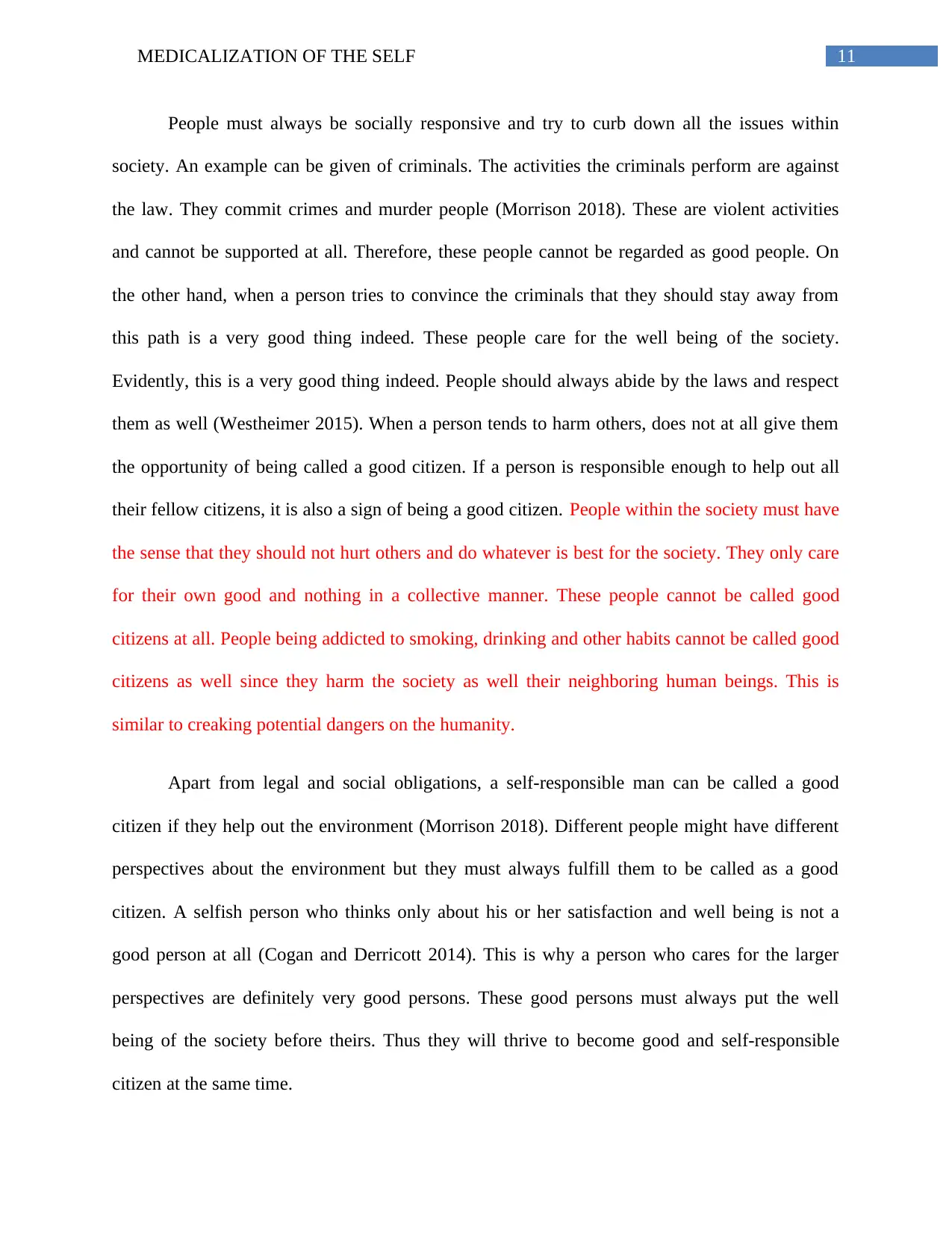
11MEDICALIZATION OF THE SELF
People must always be socially responsive and try to curb down all the issues within
society. An example can be given of criminals. The activities the criminals perform are against
the law. They commit crimes and murder people (Morrison 2018). These are violent activities
and cannot be supported at all. Therefore, these people cannot be regarded as good people. On
the other hand, when a person tries to convince the criminals that they should stay away from
this path is a very good thing indeed. These people care for the well being of the society.
Evidently, this is a very good thing indeed. People should always abide by the laws and respect
them as well (Westheimer 2015). When a person tends to harm others, does not at all give them
the opportunity of being called a good citizen. If a person is responsible enough to help out all
their fellow citizens, it is also a sign of being a good citizen. People within the society must have
the sense that they should not hurt others and do whatever is best for the society. They only care
for their own good and nothing in a collective manner. These people cannot be called good
citizens at all. People being addicted to smoking, drinking and other habits cannot be called good
citizens as well since they harm the society as well their neighboring human beings. This is
similar to creaking potential dangers on the humanity.
Apart from legal and social obligations, a self-responsible man can be called a good
citizen if they help out the environment (Morrison 2018). Different people might have different
perspectives about the environment but they must always fulfill them to be called as a good
citizen. A selfish person who thinks only about his or her satisfaction and well being is not a
good person at all (Cogan and Derricott 2014). This is why a person who cares for the larger
perspectives are definitely very good persons. These good persons must always put the well
being of the society before theirs. Thus they will thrive to become good and self-responsible
citizen at the same time.
People must always be socially responsive and try to curb down all the issues within
society. An example can be given of criminals. The activities the criminals perform are against
the law. They commit crimes and murder people (Morrison 2018). These are violent activities
and cannot be supported at all. Therefore, these people cannot be regarded as good people. On
the other hand, when a person tries to convince the criminals that they should stay away from
this path is a very good thing indeed. These people care for the well being of the society.
Evidently, this is a very good thing indeed. People should always abide by the laws and respect
them as well (Westheimer 2015). When a person tends to harm others, does not at all give them
the opportunity of being called a good citizen. If a person is responsible enough to help out all
their fellow citizens, it is also a sign of being a good citizen. People within the society must have
the sense that they should not hurt others and do whatever is best for the society. They only care
for their own good and nothing in a collective manner. These people cannot be called good
citizens at all. People being addicted to smoking, drinking and other habits cannot be called good
citizens as well since they harm the society as well their neighboring human beings. This is
similar to creaking potential dangers on the humanity.
Apart from legal and social obligations, a self-responsible man can be called a good
citizen if they help out the environment (Morrison 2018). Different people might have different
perspectives about the environment but they must always fulfill them to be called as a good
citizen. A selfish person who thinks only about his or her satisfaction and well being is not a
good person at all (Cogan and Derricott 2014). This is why a person who cares for the larger
perspectives are definitely very good persons. These good persons must always put the well
being of the society before theirs. Thus they will thrive to become good and self-responsible
citizen at the same time.
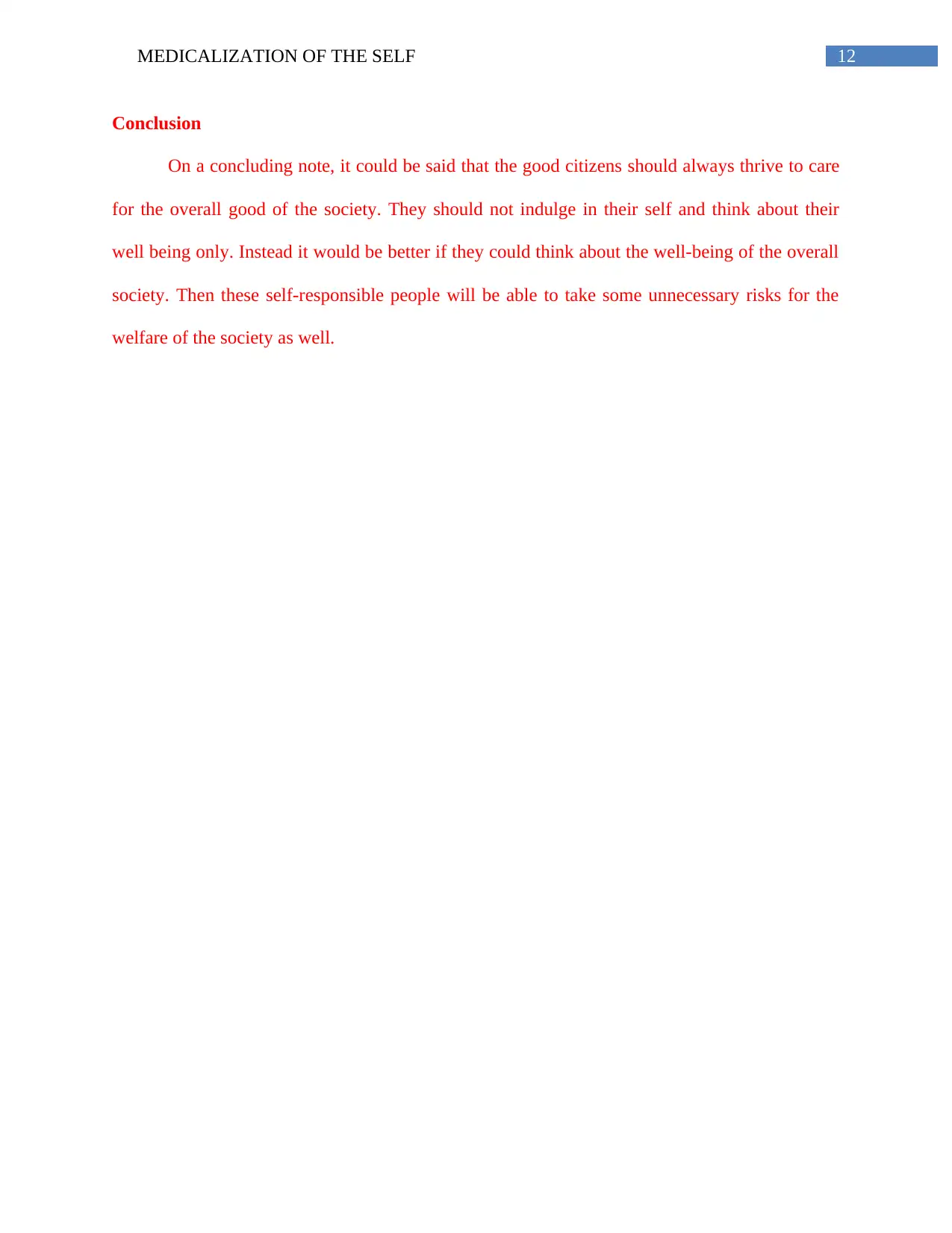
12MEDICALIZATION OF THE SELF
Conclusion
On a concluding note, it could be said that the good citizens should always thrive to care
for the overall good of the society. They should not indulge in their self and think about their
well being only. Instead it would be better if they could think about the well-being of the overall
society. Then these self-responsible people will be able to take some unnecessary risks for the
welfare of the society as well.
Conclusion
On a concluding note, it could be said that the good citizens should always thrive to care
for the overall good of the society. They should not indulge in their self and think about their
well being only. Instead it would be better if they could think about the well-being of the overall
society. Then these self-responsible people will be able to take some unnecessary risks for the
welfare of the society as well.
Paraphrase This Document
Need a fresh take? Get an instant paraphrase of this document with our AI Paraphraser

13MEDICALIZATION OF THE SELF
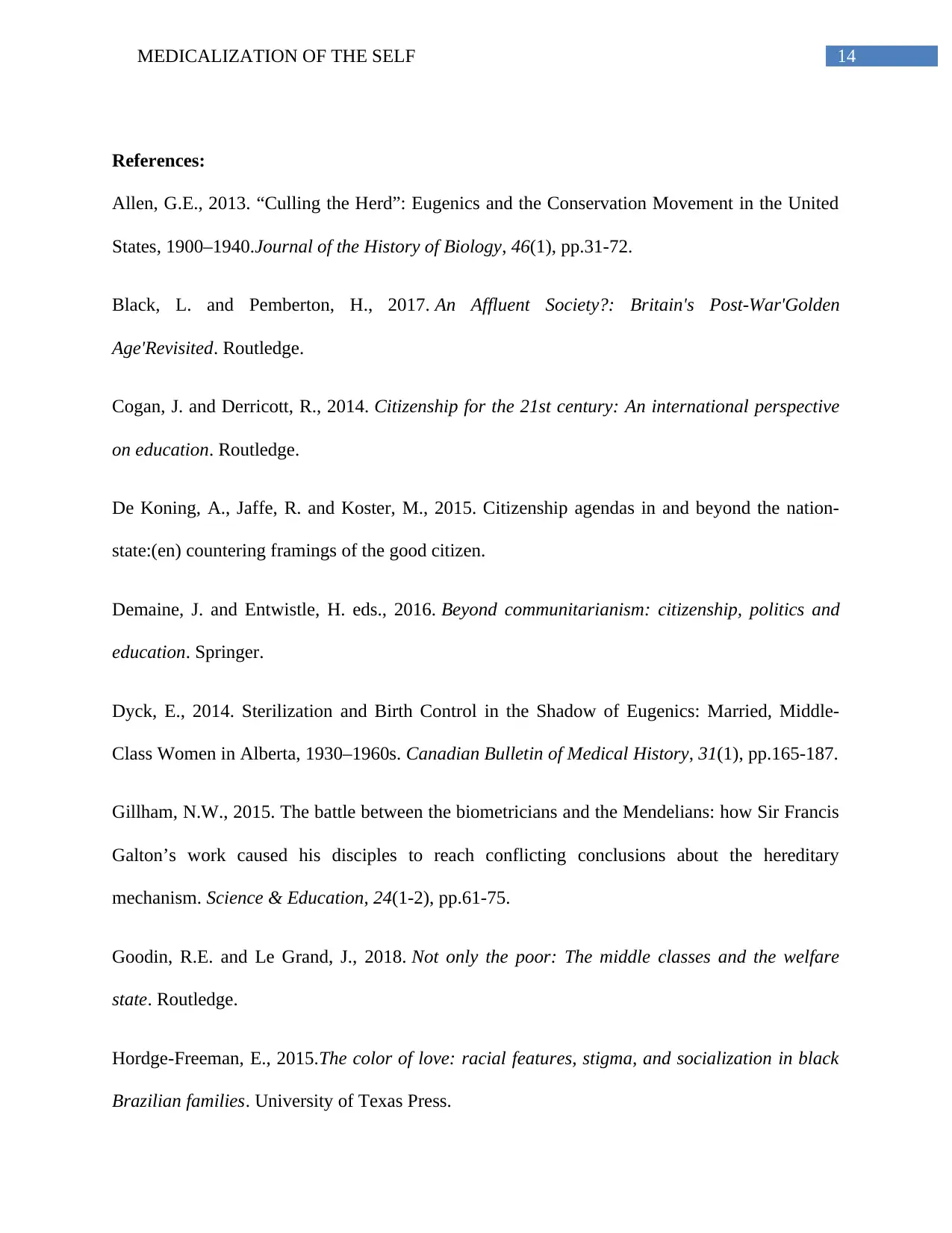
14MEDICALIZATION OF THE SELF
References:
Allen, G.E., 2013. “Culling the Herd”: Eugenics and the Conservation Movement in the United
States, 1900–1940.Journal of the History of Biology, 46(1), pp.31-72.
Black, L. and Pemberton, H., 2017. An Affluent Society?: Britain's Post-War'Golden
Age'Revisited. Routledge.
Cogan, J. and Derricott, R., 2014. Citizenship for the 21st century: An international perspective
on education. Routledge.
De Koning, A., Jaffe, R. and Koster, M., 2015. Citizenship agendas in and beyond the nation-
state:(en) countering framings of the good citizen.
Demaine, J. and Entwistle, H. eds., 2016. Beyond communitarianism: citizenship, politics and
education. Springer.
Dyck, E., 2014. Sterilization and Birth Control in the Shadow of Eugenics: Married, Middle-
Class Women in Alberta, 1930–1960s. Canadian Bulletin of Medical History, 31(1), pp.165-187.
Gillham, N.W., 2015. The battle between the biometricians and the Mendelians: how Sir Francis
Galton’s work caused his disciples to reach conflicting conclusions about the hereditary
mechanism. Science & Education, 24(1-2), pp.61-75.
Goodin, R.E. and Le Grand, J., 2018. Not only the poor: The middle classes and the welfare
state. Routledge.
Hordge-Freeman, E., 2015.The color of love: racial features, stigma, and socialization in black
Brazilian families. University of Texas Press.
References:
Allen, G.E., 2013. “Culling the Herd”: Eugenics and the Conservation Movement in the United
States, 1900–1940.Journal of the History of Biology, 46(1), pp.31-72.
Black, L. and Pemberton, H., 2017. An Affluent Society?: Britain's Post-War'Golden
Age'Revisited. Routledge.
Cogan, J. and Derricott, R., 2014. Citizenship for the 21st century: An international perspective
on education. Routledge.
De Koning, A., Jaffe, R. and Koster, M., 2015. Citizenship agendas in and beyond the nation-
state:(en) countering framings of the good citizen.
Demaine, J. and Entwistle, H. eds., 2016. Beyond communitarianism: citizenship, politics and
education. Springer.
Dyck, E., 2014. Sterilization and Birth Control in the Shadow of Eugenics: Married, Middle-
Class Women in Alberta, 1930–1960s. Canadian Bulletin of Medical History, 31(1), pp.165-187.
Gillham, N.W., 2015. The battle between the biometricians and the Mendelians: how Sir Francis
Galton’s work caused his disciples to reach conflicting conclusions about the hereditary
mechanism. Science & Education, 24(1-2), pp.61-75.
Goodin, R.E. and Le Grand, J., 2018. Not only the poor: The middle classes and the welfare
state. Routledge.
Hordge-Freeman, E., 2015.The color of love: racial features, stigma, and socialization in black
Brazilian families. University of Texas Press.
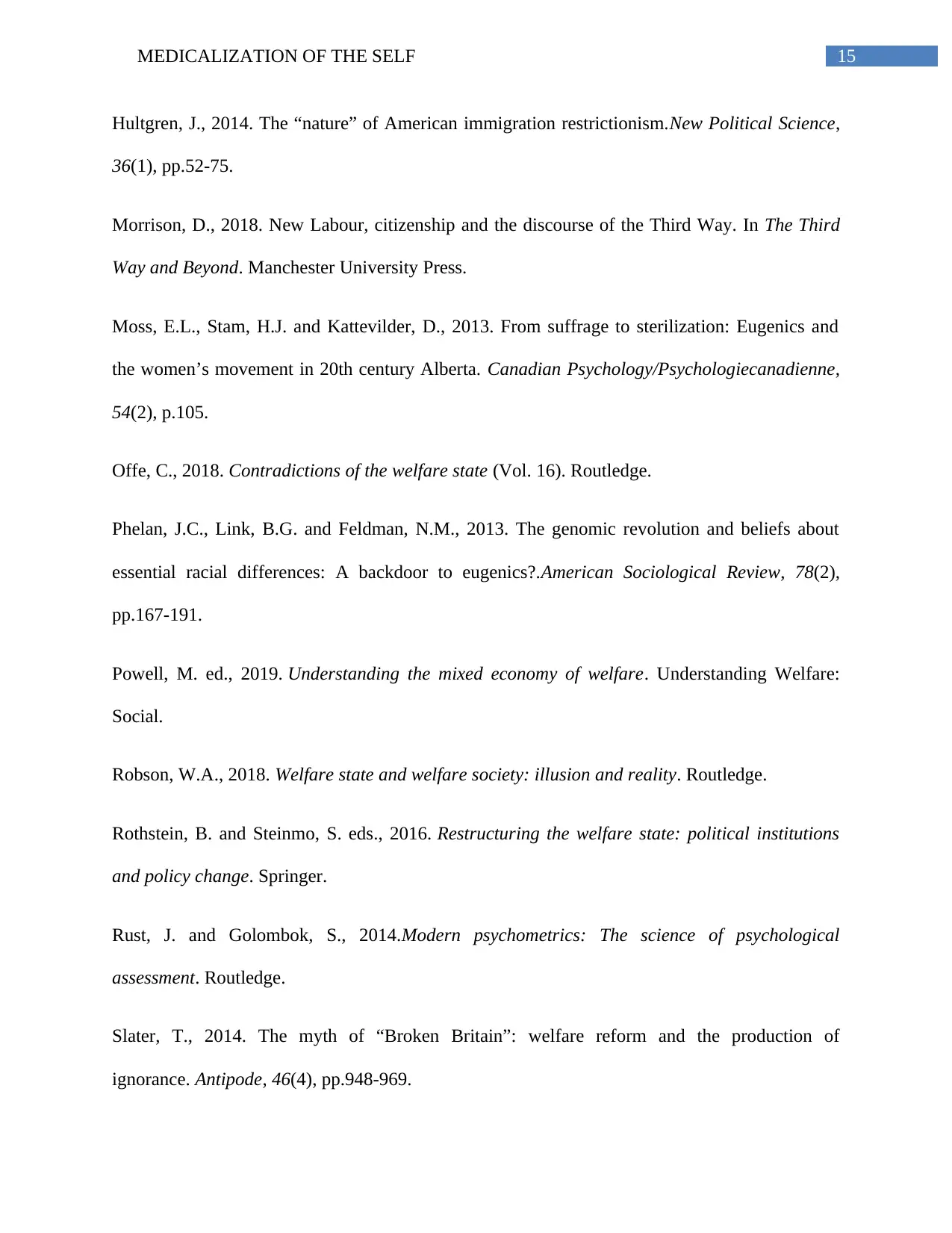
15MEDICALIZATION OF THE SELF
Hultgren, J., 2014. The “nature” of American immigration restrictionism.New Political Science,
36(1), pp.52-75.
Morrison, D., 2018. New Labour, citizenship and the discourse of the Third Way. In The Third
Way and Beyond. Manchester University Press.
Moss, E.L., Stam, H.J. and Kattevilder, D., 2013. From suffrage to sterilization: Eugenics and
the women’s movement in 20th century Alberta. Canadian Psychology/Psychologiecanadienne,
54(2), p.105.
Offe, C., 2018. Contradictions of the welfare state (Vol. 16). Routledge.
Phelan, J.C., Link, B.G. and Feldman, N.M., 2013. The genomic revolution and beliefs about
essential racial differences: A backdoor to eugenics?.American Sociological Review, 78(2),
pp.167-191.
Powell, M. ed., 2019. Understanding the mixed economy of welfare. Understanding Welfare:
Social.
Robson, W.A., 2018. Welfare state and welfare society: illusion and reality. Routledge.
Rothstein, B. and Steinmo, S. eds., 2016. Restructuring the welfare state: political institutions
and policy change. Springer.
Rust, J. and Golombok, S., 2014.Modern psychometrics: The science of psychological
assessment. Routledge.
Slater, T., 2014. The myth of “Broken Britain”: welfare reform and the production of
ignorance. Antipode, 46(4), pp.948-969.
Hultgren, J., 2014. The “nature” of American immigration restrictionism.New Political Science,
36(1), pp.52-75.
Morrison, D., 2018. New Labour, citizenship and the discourse of the Third Way. In The Third
Way and Beyond. Manchester University Press.
Moss, E.L., Stam, H.J. and Kattevilder, D., 2013. From suffrage to sterilization: Eugenics and
the women’s movement in 20th century Alberta. Canadian Psychology/Psychologiecanadienne,
54(2), p.105.
Offe, C., 2018. Contradictions of the welfare state (Vol. 16). Routledge.
Phelan, J.C., Link, B.G. and Feldman, N.M., 2013. The genomic revolution and beliefs about
essential racial differences: A backdoor to eugenics?.American Sociological Review, 78(2),
pp.167-191.
Powell, M. ed., 2019. Understanding the mixed economy of welfare. Understanding Welfare:
Social.
Robson, W.A., 2018. Welfare state and welfare society: illusion and reality. Routledge.
Rothstein, B. and Steinmo, S. eds., 2016. Restructuring the welfare state: political institutions
and policy change. Springer.
Rust, J. and Golombok, S., 2014.Modern psychometrics: The science of psychological
assessment. Routledge.
Slater, T., 2014. The myth of “Broken Britain”: welfare reform and the production of
ignorance. Antipode, 46(4), pp.948-969.
Secure Best Marks with AI Grader
Need help grading? Try our AI Grader for instant feedback on your assignments.
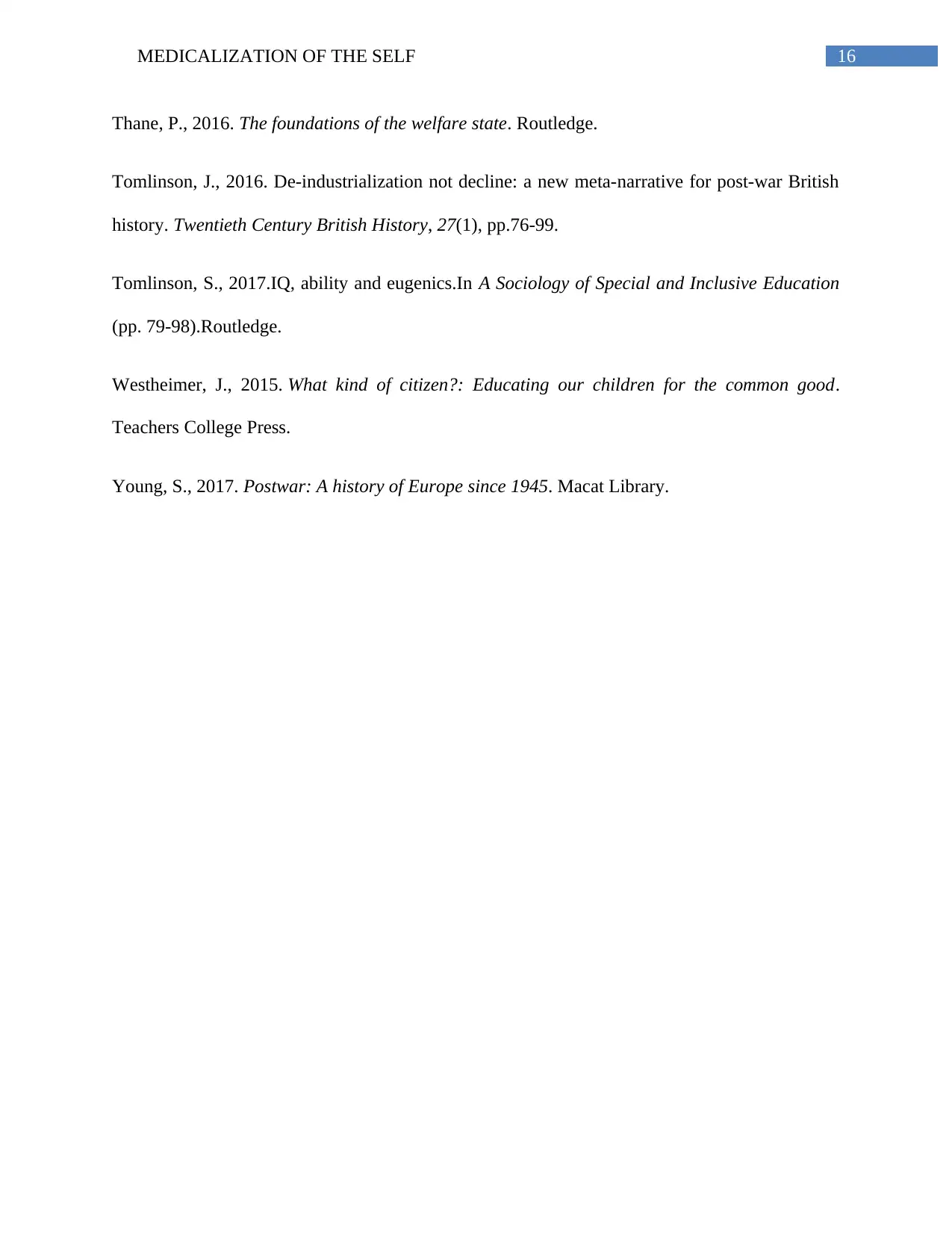
16MEDICALIZATION OF THE SELF
Thane, P., 2016. The foundations of the welfare state. Routledge.
Tomlinson, J., 2016. De-industrialization not decline: a new meta-narrative for post-war British
history. Twentieth Century British History, 27(1), pp.76-99.
Tomlinson, S., 2017.IQ, ability and eugenics.In A Sociology of Special and Inclusive Education
(pp. 79-98).Routledge.
Westheimer, J., 2015. What kind of citizen?: Educating our children for the common good.
Teachers College Press.
Young, S., 2017. Postwar: A history of Europe since 1945. Macat Library.
Thane, P., 2016. The foundations of the welfare state. Routledge.
Tomlinson, J., 2016. De-industrialization not decline: a new meta-narrative for post-war British
history. Twentieth Century British History, 27(1), pp.76-99.
Tomlinson, S., 2017.IQ, ability and eugenics.In A Sociology of Special and Inclusive Education
(pp. 79-98).Routledge.
Westheimer, J., 2015. What kind of citizen?: Educating our children for the common good.
Teachers College Press.
Young, S., 2017. Postwar: A history of Europe since 1945. Macat Library.
1 out of 17
Related Documents
Your All-in-One AI-Powered Toolkit for Academic Success.
+13062052269
info@desklib.com
Available 24*7 on WhatsApp / Email
![[object Object]](/_next/static/media/star-bottom.7253800d.svg)
Unlock your academic potential
© 2024 | Zucol Services PVT LTD | All rights reserved.





